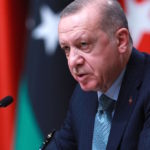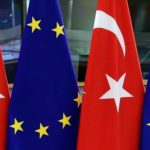Read-outs” of presidential conversations with world leaders are hardly literary affairs. They usually consist of confirmation that the discussion took place and a short summary of the conversation in a few clipped sentences. And, like everything else in Washington, read-outs are part of a game that journalists, analysts and online commentators play to divine what was actually said, the rapport between leaders and the state of bilateral relations between the United States and the country whose president, prime minister or king was on the other end of the line.
Turkey-watchers inside the Beltway are eagerly awaiting reports from Monday’s planned conversation between President Joe Biden and Turkey’s President Recep Tayyip Erdogan on the sidelines of the NATO summit in Brussels. After the two leaders’ first phone call in April, the frostiness between the NATO allies jumped from the page of the two-sentence readout. It didn’t help that Biden was placing the call to warn Erdogan that the White House would be recognizing the 1915 Armenian Genocide, a step Turkey has vehemently opposed for decades.
Biden’s decision to recognize the genocide, and his administration’s overall willingness to be tougher on Turkey, heightens the drama surrounding Monday’s highly anticipated meeting. Ankara’s relations with the United States, Europe and NATO have been on the skids for nearly five years, as Turkey has flexed its muscles by buying Russian weaponry, menaced NATO allies in the Eastern Mediterranean and cracked down on domestic opponents in a wave of repression. There is a growing sense inside the Beltway that official Washington has finally had enough with the Turkish government.
So will Joe from Scranton give Erdogan the “C’mon man! No malarkey!” treatment? That would certainly warm the hearts of an array of lawmakers, policy experts, journalists, human rights activists and dissidents, but it probably will not amount to much even if Biden privately reads Erdogan the riot act. Despite the braying for a pound of Turkish flesh in Washington these days, those expecting fireworks at the Biden-Erdogan meeting are likely to be disappointed. Biden can’t do much about the geopolitical dilemma Turkey poses, and he is not likely to acknowledge the tension — at least publicly — given his emphasis on repairing transatlantic ties and showing solidarity with allies. Ankara will remain a NATO ally on paper, but it has long stopped being a partner — and that isn’t about to change anytime soon.
Turkey’s advantage within NATO has always been its location. Close to Russia, the Middle East and the Balkans, the country is an indispensable asset on NATO’s southeastern flank. This has always given Ankara a certain amount of freedom to pursue policies that didn’t quite align with NATO, whether it was the soft authoritarianism of four successful military coups between 1960 and 1997 or the occupation of northern Cyprus that began in 1974 and continues today. In recent years, Erdogan, who regards Turkey as a great power in its own right, has tested the limits of Ankara’s privileged position.
Although Biden is unlikely to take Erdogan to task in front of cameras in Brussels, his administration has responded to the long list of irritants on the U.S.-Turkey agenda by markedly changing the tone of bilateral ties. The State Department has been unusually tough (by its own mealy-mouthed standard) on the Turkish government’s use of riot police against student protesters and the sham trial of a Turkish businessman and American academic who were absurdly accused of plotting the failed July 2016 coup d’état. The White House itself issued a statement when Turkey withdrew from a 2011 multinational agreement to combat domestic violence against women, which the Turkish president’s office claimed was “hijack[ed] by a group attempting to normalize homosexuality.”
And then, of course, there was the Armenian genocide recognition, something Armenian-American activists were hoping to see from President Barack Obama, but he punted for fear of upsetting an important American ally. A lot has changed since then, though.
Other, longer-standing differences between the allies include the fight against the Islamic State in Syria, where the United States has relied on a Kurdish fighting force that Turkey regards as a terrorist organization; the presence of Erdogan arch-enemy Fethullah Gulen in the United States; and the beatdown Turkish security agents gave to American citizens protesting Erdogan in May 2017.
Less well-understood on this side of the Atlantic is that Ankara has proved a major headache for NATO, given its often intemperate relations with other alliance members. Last summer, for example, Turkey precipitated a crisis with fellow NATO allies Greece and France. To make a long story short, Turkey drew a maritime boundary with Libya that has no legal basis and essentially cut the Mediterranean in half — in addition to coming perilously close to the Greek island, Crete (where there may be significant undersea gas fields). France, which regards itself as a Mediterranean power, took exception to the Turkish move, as did the Greeks, for obvious reasons. At the same time, Turkey was prospecting for gas in the waters of the Republic of Cyprus — which is a member of the EU, but not of NATO — precipitating a show of Greek and French military support for the island.
There were no shots fired, but that was hardly a given. Beyond the Mediterranean, last year Turkey also threatened to send Syrian and other refugees into Greece and other European and NATO countries.
In one sense, all this muscle-flexing was a rational response to what Turkish leaders regarded as an effort by Greece (and its allies Egypt, Cyprus and Israel) to box Turkey into a very small part of the Mediterranean, despite its 995-mile coastline with that body of water. In another sense, Turkey was demonstrating that it harbors its own geopolitical interests separate from those of NATO — a reality the alliance has yet to contend with, but also can’t do much about.
And then there is Russia. Turkey and Russia have deepened their commercial, diplomatic and military ties in recent years, but this relationship is not as straightforward as commonly believed.
The most important indication of Turkey’s ambivalence toward NATO has been Erdogan’s determination to purchase and deploy Russia’s S-400 air defense system — the most sophisticated in Moscow’s arsenal — over the objections of the United States and European allies. Despite repeated American warnings, removal of Turkey from the F-35 joint strike fighter program and the imposition of sanctions by an incensed Congress, Turkey went through with the transaction.
To some observers, the S-400 saga clearly shows that Ankara is aligning with Moscow. Similarly, a few weeks ago, angry European diplomats leaked to the press that Turkey watered down a NATO statement condemning the Belorussian hijacking of a Ryanair flight to apprehend a dissident journalist. The Europeans implied that Turkey wanted to take a softer stance against Belarus because of Erdogan’s desire to curry favor with Russian President Vladimir Putin.
But Ankara’s vocal critics in Europe and the United States often overlook that the Turkish and Russian governments are on opposite ends of every major conflict in the relevant regions, including Syria, Libya, Nagorno-Karabakh and Ukraine. If that is the case, why would the Turkish government buy the S-400, and why have Erdogan and Putin worked so hard to compartmentalize their differences?
The answer can be seen in a statement by Interior Minister Suleyman Soylu just before the first S-400 components arrived to an airbase outside of Ankara. The pugnacious minister declared that it was Turkey’s “Independence Day” — that is, independence from NATO and the United States. Turkish nationalists like Erdogan and Soylu chafe at what they perceive to be NATO’s long-term effort to render Ankara a mere appendage of the alliance that is expected to pursue other countries’ interests and goals. Instead, leaders in Ankara regard Turkey on the same level as major European powers. They also consider their country a Mediterranean power, a Eurasian power and a Muslim power.
In this context, Turkey’s relations with Russia take on a somewhat different hue. Erdogan’s cooperation with Russia in certain areas is not a sign that he is Putin’s stooge, just as his opposition to Russia on other matters doesn’t make Ankara the bulwark against Moscow that its NATO allies want it to be. Rather, Erdogan’s double-edged approach underscores Ankara’s determination to be an independent and powerful player on the global stage in its own right.
This is what makes the debate at NATO over how to handle this troublesome ally so complicated. The allies understand the value of Turkey and want to keep it onside, but Erdogan seems to be of two minds on whether NATO matters to Turkey. He does not want to withdraw from it, but his actions suggest that he does not believe an international order led by America — and thus by NATO — enhances Turkish power. Whatever happens between the American and Turkish presidents in Belgium, Turkey’s leaders have and will continue to put their NATO partners on notice that the country will pursue its own goals, even if that means conflict with its allies.
Rather than sweeping bad Turkish behavior under the rug as previous administrations have done, Biden seems to have decided on a different approach: working with Erdogan on areas of shared interest, such as Ukraine and Black Sea security, but otherwise de-emphasizing what was once seen as a critical bilateral relationship.
The Biden-Erdogan meeting will likely be as chilly as the April read-out, but the NATO summit will end just as it began: with leaders still grumbling over Ankara’s role in softening the alliance’s pushback against Belarus, the S-400 issue likely still unresolved and American doubts about an important but difficult ally unchanged. In other words, Turkey is a problem, and don’t expect either Biden or Erdogan to do much about that anytime soon.
Source: Politico



